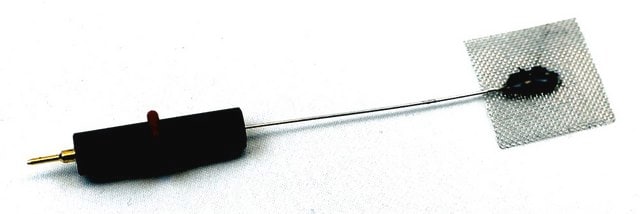357375
Platinum
wire, diam. 0.076 mm, ≥99.99% trace metals basis
Synonym(s):
Platinum element
Sign Into View Organizational & Contract Pricing
All Photos(1)
About This Item
Empirical Formula (Hill Notation):
Pt
CAS Number:
Molecular Weight:
195.08
EC Number:
MDL number:
UNSPSC Code:
12141734
PubChem Substance ID:
NACRES:
NA.23
Recommended Products
Quality Level
Assay
≥99.99% trace metals basis
form
wire
resistivity
10.6 μΩ-cm, 20°C
diam.
0.076 mm
bp
3827 °C (lit.)
mp
1772 °C (lit.)
density
21.45 g/cm3 (lit.)
SMILES string
[Pt]
InChI
1S/Pt
InChI key
BASFCYQUMIYNBI-UHFFFAOYSA-N
Application
Suitable for thermocouple use
Quantity
100 mg = 1 m; 500 mg = 5 m
Storage Class Code
13 - Non Combustible Solids
WGK
nwg
Flash Point(F)
Not applicable
Flash Point(C)
Not applicable
Choose from one of the most recent versions:
Already Own This Product?
Find documentation for the products that you have recently purchased in the Document Library.
Customers Also Viewed
Tao Xiong et al.
Journal of biomedical nanotechnology, 9(2), 274-280 (2013-05-01)
Noninvasive molecular fluorescence imaging in vivo which combines Optical imaging with genetic marker technology can real time monitor the development of tumor, through the use of human adenoid cystic carcinoma cell (ACC-M) and lung carcinoma cells SPC-A1 were thansfected by
Hiroaki Akamatsu et al.
Japanese journal of clinical oncology, 43(6), 664-668 (2013-04-16)
Interstitial lung disease associated with gefitinib is a critical adverse reaction. When geftinib was administered to EGFR-unknown patients, the interstitial lung disease incidence rate was approximately 3-4% in Japan, and usually occurs during the first 4 weeks of treatment. However
Mohammad Shamsuddin Ahmed et al.
Journal of nanoscience and nanotechnology, 13(1), 306-314 (2013-05-08)
Multi-walled carbon nanotube grafted Pt nanoparticles via nitrogen atom (MWCNT-N-Pt) has chemically synthesized and characterized as an efficient oxygen reduction reaction (ORR) catalysts. Structural and morphological properties of the electrocatalyst have characterized by transmission electron microscopy (TEM), energy-dispersive X-ray spectroscopy
Yao-Hsuan Tseng et al.
Biochimica et biophysica acta, 1830(6), 3787-3795 (2013-04-02)
Traditional antibacterial photocatalysts are primarily induced by ultraviolet light to elicit antibacterial reactive oxygen species. New generation visible-light responsive photocatalysts were discovered, offering greater opportunity to use photocatalysts as disinfectants in our living environment. Recently, we found that visible-light responsive
Downregulation of glutathione transferase π sensitizes lymphoma/leukaemia cells to platinum-based chemotherapy.
Jianli Chen et al.
British journal of haematology, 162(1), 135-137 (2013-04-12)
Our team of scientists has experience in all areas of research including Life Science, Material Science, Chemical Synthesis, Chromatography, Analytical and many others.
Contact Technical Service





